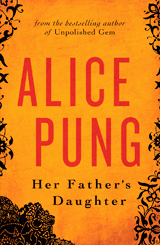lip lit: alice pung, her father’s daughter
 Alice Pung’s new memoir delves into the many facets of her relationship with her Chinese-Cambodian father through the use of anecdotes, reflections, snapshots of history and re-told memories.
Alice Pung’s new memoir delves into the many facets of her relationship with her Chinese-Cambodian father through the use of anecdotes, reflections, snapshots of history and re-told memories.
Divided into four non-chronological parts, Her Father’s Daughter begins in modern China, explores Pung’s life in Melbourne, visits her father’s past in Cambodia during the time of the Khmer Rouge and finishes with a look at a very different, present-day Cambodia.
What starts off reading like another coming-of-age story about finding one’s identity and attempting to distance oneself from the stifling grasp of family members turns into a powerful, moving tale of a man who survived harrowing conditions to become a loving father and husband. Themes of overcoming hardship, love and discovering where one came from are intertwined throughout the book.
By beginning the story with herself, her own issues and relationship with her parents, Pung provides the context for the novel. She realises that her parents’ constant, often overwhelming anxiety over her safety and well-being stems from their past experiences, and decides to dig deeper to make sense of the events that affected the way her parents see the world.
Pung’s interesting use of the third person allows us to relate not only to her, but also to her father, Kuan. Her friend and fellow writer Arnold Zable said at her Melbourne Writers Festival book launch, “If you step away from yourself, detach yourself and become the third person, you’re able to see yourself with greater honesty.” Pung’s writing is indeed searingly honest; we see her insecurities and flaws through not only her own self-deprecating observations, but also from her father’s point of view. It is through Pung’s use of third person that Kuan come to life — a character in his own right, telling stories about surviving the killing fields to go on to build a family and a new life in Australia.
Stylistically, Pung’s writing is simple, candid yet littered with vivid metaphors and similes that flow easily within her sentences. These are particularly effective for describing graphic scenes in a poetic manner, without making light of the horror that occurred in Cambodia: “Blood was slithering out of the children. It coiled thick on the floor like a snake sunning itself jerky-dry.”
At its heart, however, Her Father’s Daughter is a touching, insightful story of unconditional love between father and daughter; this much is evident in Kuan’s words, as told through Pung, who explained, “He gave us these stories as a gift to us while we were growing up.” In this intimate and compelling memoir, she takes those stories and pieces them together, forming connections between things her father went through and how they shaped him, which consequently affected the way he expressed his love towards his family.


Pingback: Her Father’s Daughter – Alice Pung |